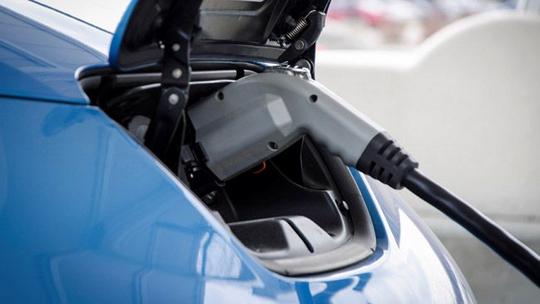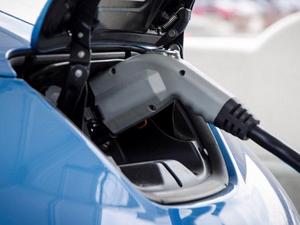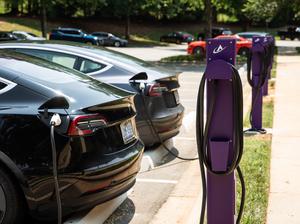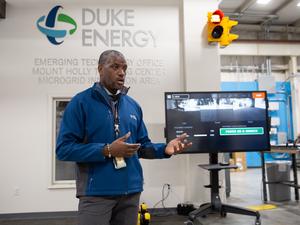
Duke Energy Corp. (NYSE: DUK) has asked N.C. regulators to approve a $600,000 pilot to test a program that would enable its utilities to manage the charging of customer electric vehicles for a flat monthly fee.
Duke plans to work with BMW of North America, Ford Motor Co., General Motors and American Honda Motor Co. Inc. to recruit 200 electric vehicle owners for the pilot. For 12 months, the participants would be able to charge their vehicles for a fixed monthly fee — $19.99 with Duke Energy Carolinas and $24.99 with Duke Energy Progress.
Duke has chosen those manufacturers because they install an Open Grid Vehicle Integration Platform in their cars. That is a specialized modem developed by the carmakers and the Electric Power Research Institute allowing utilities to access data on energy usage and charging information for each vehicle.
The charging will be managed by Duke, making use of rates that vary by time of day and other pricing signals Duke is building into its rate schedules to maximize efficiency, control peak-time demand, increase convenience for the customer and reduce carbon emissions on the electric system.
“This is a first-of-its-kind program," says Lon Huber, Duke’s vice president of rate design and strategic solutions. “It does have elements that have been tested out elsewhere. But nobody has put these two things together where you have that fixed subscription price and then the active-manage charging. So, this is a pretty cutting-edge stuff.”
Shared savings
Key advantages to the program, Huber says, is it will allow customers to charge their vehicles at home without the need of a second meter to track recharging. And it will enable Duke to control when vehicles are recharged, shifting charging to low-use hours and avoiding peak demand times. That would help reduce carbon emissions and avoid the need for additional electricity generation during peaks.
That lower peak demand will make for “savings (that) will be shared among both EV drivers and non-EV drivers,” Duke says.
“The goal here is just to go to the customer and say, 'Hey, you don't have to worry about your electricity bill going up and down, like your gasoline budget,'" Huber says. “The average gasoline average budget fluctuates. It could be $170 one month. It could be higher or lower the next. Here, we're just saying, all-you-can-charge for $19.99 and we're going to take care of that load shape (demand on the electrical system) so that it's beneficial to all customers.”
The price is more expensive at Duke Progress because it has higher electric rates than Duke Carolinas. Huber says customers must pay tax on the service, just like with phone and cable subscriptions. There is a small charge required by North Carolina regulators to reimburse storm damage costs. But those amounts are minimal, Huber says, and for the flat fee Duke will manage the charging of the vehicle with no additional costs for the electricity used.
Huber says there could be another advantage if the program works as designed. He says a fixed monthly charging fee can encourage adoption of electric vehicles by simplifying charging for customers and alleviating cost concerns.
“So that's the beauty. It's like ... everyone's winning because the vehicle customer gets this really simple, nice pricing,” he says. "And that for all customers we make sure that the charging that (the vehicle customers) do doesn’t actually increase costs on the grid.”
The charge is per vehicle. Customers with more than one electric car would have to buy a separate subscription for each. And there are safeguards Duke can use in tracking the managed charging to prevent abuse.
Nascent market
The pilot will have a single standard subscription price at each utility regardless of the vehicle's size and the battery that must be charged. For now, the owner of a GMC Hummer EV with a 200-kilowatt-hour battery will pay the same fee as the owner of a Honda Clarity, which sports a 17-kilowatt-hour battery.
The Hummer will take a lot more electricity to recharge than the Clarity, just like it uses more gas. Huber says the pilot may help Duke determine if it should have different subscription levels, corresponding to battery size, for instance, or recharging demand. But initially, Duke is trying the single cost to make the program simpler and more appealing to customers.
Duke did its first round of EV charging pilots in 2020, when N.C. regulators approved a $25 million project aimed at establishing electric vehicle charging stations in public areas and in apartment complexes. A broader, $56 million project was proposed last year that contained additional money for public charging stations, assistance for school systems to buy electric-power buses and to put commercial charging stations on major highways. Regulators have not yet acted on that proposal.
This latest pilot is designed to piggyback on a small part of the 2021 proposal that included $1.2 million to assist homeowners with the installation of 240-volt power lines for car charging, Huber says.
“So, a customer can say go to the dealer and the dealer can say, ‘Hey, don't worry about the charging infrastructure. Duke has a program to install it. And by the way, you don't have to even worry about the impact of your bill,’” Huber says.
Duke says in its application to the N.C. Utilities Commission, filed on Feb. 11, that the pilot will help Duke understand the impact of the charging market better and ultimately to help shape it.
"The EV market is currently nascent, and for much of the population customer charging patterns have not yet been established,” the filing says. “This affords a unique opportunity to impact customer expectations, technology adoptions, and behaviors to ensure that EV charging is cleaner and less expensive.”
Duke Carolinas and Duke Progress are subsidiaries of Charlotte-based Duke Energy Corp.
The initial version of this story mistakenly reported the status of a $56 million electric vehicle charging proposal. The N.C. Utilities Commission has not acted yet on the proposal.







